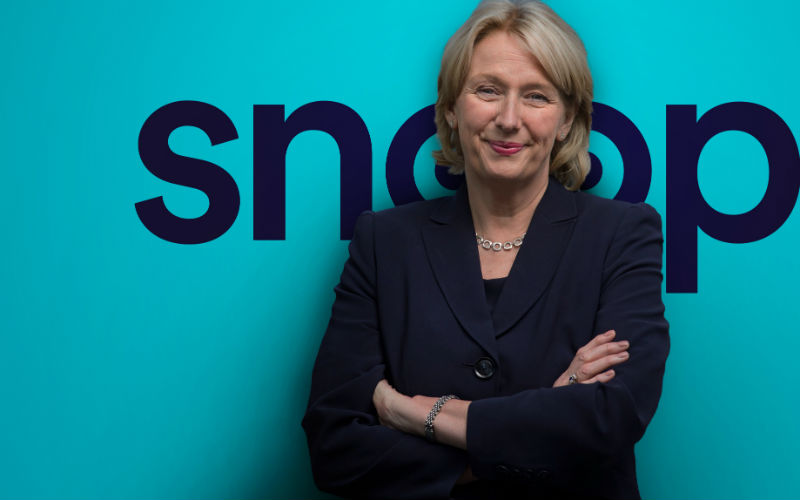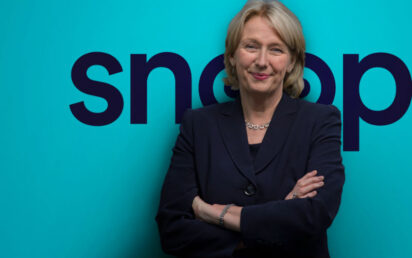For three decades the word Snoop immediately conjured the dreadlocked image of a certain American hip-hop artist.
But type Snoop into Google today and the top result is not of a multi-platinum-selling rapper, but a FinTech taking the fight to big business on behalf of consumers (yes, it’s a paid advert).
If Dame Jayne-Anne Gadhia has her way, her start-up will also be the first Snoop on everyone’s lips.
“We did think about that, but decided we couldn’t change our name because of him,” she jokes in an interview with BusinessCloud. “If he decides to sue us, it’ll make us even more famous!”
As CEO of Virgin Money for more than a decade, Gadhia witnessed first-hand the unstoppable rise of open banking and FinTech following the 2008 global financial crisis.
“It started to become clear to me about three or four years ago that the big banks are going to continue to be very successful because they’ve got the money to develop – and so the challenger banks really need to be at the forefront of technical and digital innovation,” she says.
“At Virgin Money we were focused on building a new digital bank which we hoped would be able to compete with the likes of Monzo and Starling in the new generation of banking.”
However it all came to an abrupt end when Clydesdale acquired the firm in 2018. “They’d already got their own digital bank, which was a sort of digital front-end for their traditional banking systems. My more innovative Monzo-like digital team were made redundant,” she states matter-of-factly.
Soon afterwards they met for coffee and conversation quickly turned to the future. “They were obviously miserable that the excitement we’d all felt about building this new future wasn’t going to happen,” says Gadhia. “They said to me, ‘Look, why don’t we just do it anyway?’
“One of my friends and colleagues over many years, [Snoop co-founder and CFO] Dave Dyer, said, ‘I don’t want to build another bloody bank!’ We all agreed with that – but realised that we understood banking, systems and technology. So why not use all of that to go beyond banking, and to use banking experience to give customers a better deal?”
The idea for Snoop was born. The FCA-approved app connects to a customer’s bank accounts and, using a mix of artificial intelligence and human expertise, gives tailored insights into how they might be able to save money. Suggestions range from swapping home insurance or energy provider to supermarket food deals and entertainment services.
These are delivered either through notifications or by directly visiting the app itself. “We knew that we had to make it simple and engaging and straightforward because banking is none of those things,” explains Gadhia. “We’re trying to help people see their banking in quick and easy ways that suit them, so they can categorise their spend, and see how to spend more efficiently.”
You can certainly see the influence of Monzo on Snoop. Yet if you’ve always hated spending your free time researching multiple providers in order to make a saving, using the app could result in even greater personal benefits.
“Historically part of the reason banks make profit is the apathy of customers. You think it might be costing you a few quid extra, but you can’t be bothered to change – it’s too complicated.
“One particular woman dropped me a note on Twitter to say how Snoop told her she could save £727 on her utility bill – and that it was quickly ‘all done and dusted’. My development director was the first tester of our app and it told him that his Sky package had increased from £18 to £80! He rang up Sky and they reverted it to £18.
“After a long day, I myself just want to put my feet up and have a glass of wine – and I find out that I’m getting ripped off as a result. It shows how we’ve all overspent because it hasn’t previously been that simple to see previously.
“This is you snooping on the big companies to find the better deal. We want to help customers to use their data for their own benefit, rather than the other way around.”
Perhaps the name has negative connotations – particularly in the wake of the Facebook Cambridge Analytica scandal – but Gadhia has no regrets about adopting it. “People don’t ask me how my new business is going – they say ‘how’s Snoop?’ It’s very memorable and that’s a powerful thing when it comes to branding.
“Virgin was a controversial name to use for the brand of a company back in the 1970s. But it’s done it no harm at all!”
The firm attracted 5,000 beta customers in January 2020. The founder and executive chair says these testers urged her team to launch fully when COVID-19 hit – and it did so as the UK entered lockdown. A few weeks and a £3.2m funding round later, Snoop had 25,000 users.
“RBS closed down [its challenger bank platform] Bo recently [just five months after launching]. Bo had less customers when they closed it than we got in our first week. Isn’t that fascinating?” she asks mischievously.
“The big banks are obviously critical for the economy and for society, but I wonder whether in the future they will become more like utility companies: they’ll provide the platform for banking while apps and services like Snoop will enrich customers’ financial experience – because it’s different to banking.
“When we launched Virgin in financial services [in 2007] I slept under my desk for days on end while we were testing systems and putting patches in place, getting the thing right. To be able to launch this business from lockdown so effectively, because of the technology, I find thrilling and extraordinary.”
She says her team used to “jump through hoops” to gain access to marketing data which was potentially months out of date. In contrast, all of Snoop’s marketing spend is digital and can be viewed in real-time. “Our marketing director will work out how much money he wants to spend each day and with which social engine – and by 11am he can see what’s working and what isn’t working and tweak it to optimise the day. It’s almost like doing a Sudoku!”
Having founded Snoop in January 2019, Gadhia accepted an advisory role at Silicon Valley software giant Salesforce, in part to learn more about the tech sector. Upon meeting its billionaire entrepreneur Marc Benioff she found herself accepting the UK CEO job – but six months later returned to her original position.
“Salesforce is a brilliant company and Marc is an inspirational leader. We hit it off and he asked me to run the London business as CEO,” she recounts. “Dazzled by his brilliance, I said: ‘Yes!’
“The truth of the matter is, when you’re working for a big American firm based in San Francisco, that being a CEO in London isn’t the same as running your own business. You’re part of a big matrix. And effectively, that meant that I’d be a sales director, because all of the strategic decisions, the financial decisions – which is what I’m good at – that’s really all done out of San Francisco.
“I probably knew that when I signed up, but it wasn’t immediately clear to me until I was actually in London office. They are lovely people, but it’s a sales team. And the role really was what we in the UK would call sales director. And that’s not what I am.”
Snoop has received “substantial and significant” financial backing from Salesforce’s investment arm as part of its total £10m funding. The firm, which has long-term ambitions to grow internationally, hopes to raise a Series A round towards the end of this year.
In 2015, Gadhia led a government review into the representation of women in senior managerial roles in financial services. The resulting report prompted HM Treasury to launch the Women in Finance Charter. There are now 320 companies signed up to this – but Gadhia is concerned that coronavirus may stem the tide of change.
“I worry because the problem with gender work is that, particularly if it remains the task of the HR department rather than the CEO, when trouble hits it can be something that falls low down the priority list,” she says. “It’ll be really interesting to see, as we all come back to work after the crisis, if we are coming back as a more diverse work population – or not.
“Diversity might not be at the fore of everybody’s thinking as we start to crank the handle again. Part of me understands that – and part of me is fearful of it.”


